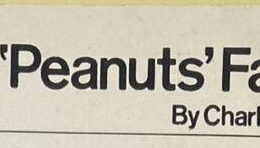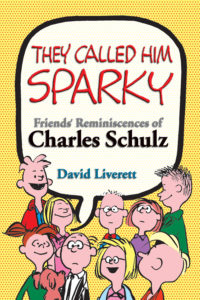Great Pumpkin Versus Lamb Of God
- By : Nat
- Category : Classic finds, Reviews
People (including Schulz) have used Peanuts to promote various religious views, and here’s another example… well, really promoting a viewpoint how you can promote certain religious views. The Defeasible Pumpkin: An Epiphany in a Pumpkin Patch, originally published by the Interdisciplinary Biblical Research Institute in 1997, features the (blatantly unlicensed) Peanuts characters reuniting in middle age, with now Evangelical minister Charlie Brown trying to convert Great Pumpkin-worshipping Linus, but finding that the arguments that he is used to relying on are matched in style and substance with Linus’s defense of his own faith.
Now, usually Peanuts is used in order to make a work approachable for a general audience. That does not seem to be a case here. Open it up, and you’re confronted not immediately with Peanuts characters chatting, but with a preface how this work is an answer to views of presuppositionalism and particularly those put forth by Cornelius Van Til, and refers to various other works involved in this obviously ongoing discussion with the sense that of course you’re well aware of these various works. (“The reader will quickly discover that this is not the sort of work, for example, that was put together by Josh McDowell in Evidence that Demands a Verdict.” Really, it would’ve taken me a long, looong time to discover that had you not pointed it out!)
But after the preface, we move on to the Peanuts, right? Nooooo! After 12 pages of preface and table of contents, we move on to the essay, a supposed collaboration between David P. Hoover and Lucy Van Pelt, to explain what the conversation alluded to in the preface is (“the essentially intramural 20th Century quarrel between presuppositional and evidential apologetes.”). So, a nice little brief introduction to help get the ball rolling? No, this goes on for forty-five pages! We get to cover topics like “Ptolemaic Geocentrism versus Copernican Heliocentrism” along the way. Of course.
(An aside: “Anyhow, being a lifelong Peanuts fan, I have rather liberally raided the imagination of the very gifted Charles Schultz.” Sigh. Big fan, doesn’t know how to spell the creator’s name.)
Now as I storyteller I’m reading (well, largely skimming) this section, reckoning that he’s doing it all wrong… that I will get to the conversation amongst the Peanuts characters, that it will show Charlie Brown and Linus trying to discuss their religion in broad terms, and display through example how CB’s logic is unable to trump Linus’s because he’s bringing the wrong logic to the table, and then Lucy will straighten it all out with counterexample logic that actually proves convincing. And given that, the story should come first, and only after should you dive into how this conversation reflects the argument going on amongst those who discuss such things, and fine tune the points using the bigger words and citing other works.
But I am wrong, at least in what I expect the story to be… because the story contains such things as :
“The irony of it all was that Linus too was a presuppositionalist! Linus had long been utterly sanguine about such Van Tillian themes as: (1) absolute ontological disparity entails absolute epistemological disparity; (2) there is an absolute ontological disparity between God’s being and human being so God’s knowledge of anything is qualitatively distinct from man’s knowledge of ostensibly the same things; (3) the only proper reasoning on the part of the creature, therefore, is analogical of divine reasoning (i.e.,
univocal reasoning with God is metaphysically impossible and equivocal reasoning isn’t reasoning); (4) probability argumentation inherently impugns divine authority as to what has been made evident; (5) one makesa fundamental beginning, therefore, by presupposing the truth of the divine; and (6) the potentiality of any system of thought cannot exceed its presuppositions.”
If you are a student of logic as applied to Christian apologetics, this may all be very interesting to you. Or not. I’m really not the person to judge this. I’m the kind of guy who will tell you that it’s wrong to say that Pig Pen’s real name is Harold (which the author does), but as for the rest, this is a book which is simply not aimed at me. Really, Peanuts books not aimed at me; what will they think of next?
You can now purchase The Defeasible Pumpkin for the Kindle… or if you’re cheap (like me) and not dedicated to having print editions of Peanuts books (not like me), you can actually download the entire book as a free PDF directly from the publisher. I read (skimmed) through the PDF, but have ordered a used copy of the 1997 print edition, because I am, after all, a guy like me.






